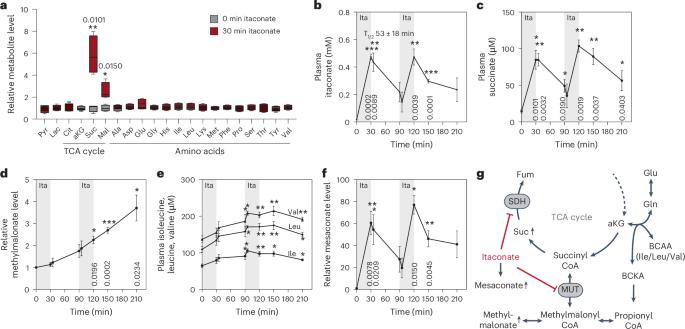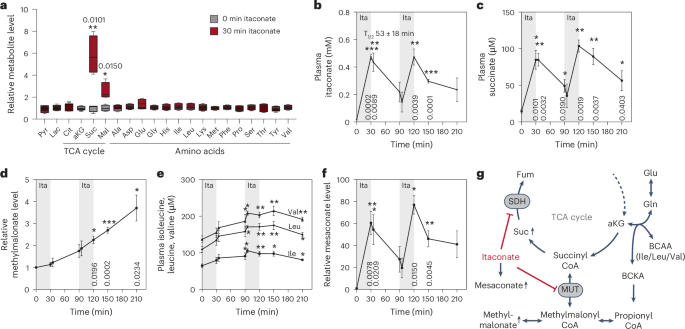体内衣康酸示踪揭示了降解途径和转化动力学
IF 20.8
1区 医学
Q1 ENDOCRINOLOGY & METABOLISM
引用次数: 0
摘要
衣康酸是一种免疫调节代谢物,可改变线粒体代谢和免疫细胞功能。这种有机酸是由TLR信号下游的三羧酸(TCA)代谢内源性合成的。目前正在研究以伊他酸盐为基础的治疗策略,以减轻多种炎症。然而,人们对衣康酸在循环中的周转率、降解动力学及其对代谢的广泛影响知之甚少。通过结合质谱法和雄性小鼠体内13C衣康酸追踪,我们证明衣康酸可以迅速从血浆中消除,通过尿液排出,并促进TCA循环代谢,特别是在肝脏和肾脏中。我们的研究结果进一步表明衣康酸转化为乙酰辅酶a、美萨酸和柠檬酸酯。衣康酸也影响支链氨基酸代谢和琥珀酸水平,表明对雄性大鼠和小鼠琥珀酸脱氢酶和甲基丙二酰辅酶a变化酶活性的功能影响。我们的发现揭示了衣康酸代谢的一个以前未知的方面,突出了它在体内的快速分解代谢,这与培养细胞的发现形成了对比。本文章由计算机程序翻译,如有差异,请以英文原文为准。


In vivo itaconate tracing reveals degradation pathway and turnover kinetics
Itaconate is an immunomodulatory metabolite that alters mitochondrial metabolism and immune cell function. This organic acid is endogenously synthesized by tricarboxylic acid (TCA) metabolism downstream of TLR signalling. Itaconate-based treatment strategies are under investigation to mitigate numerous inflammatory conditions. However, little is known about the turnover rate of itaconate in circulation, the kinetics of its degradation and the broader consequences on metabolism. By combining mass spectrometry and in vivo 13C itaconate tracing in male mice, we demonstrate that itaconate is rapidly eliminated from plasma, excreted via urine and fuels TCA cycle metabolism specifically in the liver and kidneys. Our results further reveal that itaconate is converted into acetyl-CoA, mesaconate and citramalate. Itaconate administration also influences branched-chain amino acid metabolism and succinate levels, indicating a functional impact on succinate dehydrogenase and methylmalonyl-CoA mutase activity in male rats and mice. Our findings uncover a previously unknown aspect of itaconate metabolism, highlighting its rapid catabolism in vivo that contrasts findings in cultured cells. In this study, Willenbockel et al. trace circulating itaconate in vivo to gain insight into its fate and systemic metabolism.
求助全文
通过发布文献求助,成功后即可免费获取论文全文。
去求助
来源期刊

Nature metabolism
ENDOCRINOLOGY & METABOLISM-
CiteScore
27.50
自引率
2.40%
发文量
170
期刊介绍:
Nature Metabolism is a peer-reviewed scientific journal that covers a broad range of topics in metabolism research. It aims to advance the understanding of metabolic and homeostatic processes at a cellular and physiological level. The journal publishes research from various fields, including fundamental cell biology, basic biomedical and translational research, and integrative physiology. It focuses on how cellular metabolism affects cellular function, the physiology and homeostasis of organs and tissues, and the regulation of organismal energy homeostasis. It also investigates the molecular pathophysiology of metabolic diseases such as diabetes and obesity, as well as their treatment. Nature Metabolism follows the standards of other Nature-branded journals, with a dedicated team of professional editors, rigorous peer-review process, high standards of copy-editing and production, swift publication, and editorial independence. The journal has a high impact factor, has a certain influence in the international area, and is deeply concerned and cited by the majority of scholars.
 求助内容:
求助内容: 应助结果提醒方式:
应助结果提醒方式:


